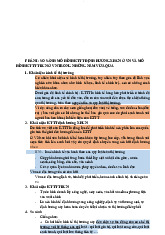





Preview text:
Lý thuyết nào giải thích tốt hơn các quốc gia nghèo?
- Firstly, modern theory focuses on internal factors within a country, primarily its ability to compete in the global economy, investing in high-value-added industries, and promoting innovation and creativity. These factors are important for developing countries to increase labor productivity and improve their competitiveness in the global market.
- Secondly, modern theory provides specific incentives for developing countries to grow their economies and create new business opportunities. This can be achieved through investments in education and training, developing high-tech skills, and promoting entrepreneurship. Modern theory also encourages developing countries to seek new business opportunities by promoting innovation and creativity.
- In contrast, dependency theory only suggests that poor countries are dependent on wealthy countries and does not provide specific advice on how to promote sustainable development and create new business opportunities.
Nội dung chính của modern theory/ dependency MODERN
- Reasons for underdevelopment are internal deficiencies
- Global South must:
- Create conditions for efficient production, free enterprise, and free trade
- Attract investment capital from the Global North
- Pass through stages of development and reach “take off”
- Historical conditions that allowed the North to do this in the 19th century do not exist now
DEPEND
- Reasons for underdevelopment are external
- Capitalist world economy is based on a division of labor between the industrialized core and underdeveloped periphery
- Global North keeps Global South poor through:
- Terms of trade and finance
- Cultural penetration
- Exploitation by multinational corporations
- Dualism—rural impoverished sector and urban modernizing sector
- Has trouble explaining the NICs
- Mặt trái của toàn cầu hoá là gì?
Criticisms:
- Job loss and wage stagnation. Globalization has led to the loss of jobs and stagnation of wages for workers in developed countries. For example, the outsourcing of manufacturing jobs to developing countries has resulted in job losses in the United States and Europe.
- Income inequality: While income disparities among countries have declined, inequality has increased within many developed and less developed countries. For example, in the United States, income inequality has risen sharply over the past few decades, with the top 1% earning a disproportionate share of the wealth.
- Globalization can lead to political inequality. Globalization has been criticized for creating political inequality, particularly in developing countries where multinational corporations often wield more power than local governments. For example, in many African countries, foreign mining companies have been accused of exploiting natural resources without adequately compensating local communities or protecting the environment.
- vai trò của ngân hàng quốc tế đối với sự pt của các nước nghèo là gì? (ví dụ VN)
The International Bank (International Bank) has a very important role in supporting the development of the country's poor, including Vietnam. Specifically, the role of the International Bank includes:
Provide funding: International banks can provide finance to the water poor to support projects in the development of infrastructure, education, health, energy and other sectors. Support Local Bank Development: International Banks can support Local Bank development by providing loans and transferring technology.
Supporting Economic Innovation: The International Bank can assist poor countries in economic innovation by providing support accounts and technical assistance
Human Resource Development Support: The International Bank can assist poor countries in human development by providing support accounts for human resource training and technology transfer. An example that can be said of the role of international banks for Vietnam is supporting the development of the country's transport infrastructure.
Specifically, the World Bank has supported Vietnam in the process of building and upgrading its transport system, including roads, railways and airways.
- Tác động của hội nhập khu vực đối với các quốc gia (ví dụ các nước đang pt)
*Positive impacts:
- Creating conditions for expanding the market, absorbing scientific and technological knowledge, capital, and restructuring the domestic economy.
- Providing opportunities to improve the quality of human resources.
- Creating conditions to promote integration of cultural and political fields, consolidating national security and defense.
- Creating a precedent for cultural integration, absorbing the quintessence of the world, enriching the national culture, and promoting social progress.
*Negative impacts:
- Regional integration increases fierce competition, leading to many businesses facing difficulties.
- Regional integration can increase the dependence of the national economy on the external market, making it vulnerable to unpredictable political, economic, and market fluctuations.
- International economic integration can widen the gap between the rich and the poor and create social inequality due to the unequal distribution of benefits and risks for different countries and social groups.
Tại sao vòng đàm phán doha dài?
The growing length of bargaining rounds or Doha Round reflects the complexity of the issues at the center of negotiations and the growing diversity of interests among WTO member governments. The first reason, along with the development of trade and the world economy, more and more new problems have arisen since the Doha Round started. It has become more common in many countries and so the problems are getting more and more complicated. For the second reason, the WTO has a lot of members, so it is increasingly difficult to maintain and secure the interests of countries. The following are some of the reasons why regional trade agreements are thriving: A regional trade agreement is a trade deal between smaller groupings of “same think” governments (typically in the same region) so countries easily reach consensus with each other. Moreover, the deadlock of the Doha Round of negotiations also caused countries to reduce their confidence in the WTO.
Tại sao các hiệp định thương mại lại nổi lên?
RTAs proliferated because some main explanations below:
- Firstly, some emphasize a country’s desire to gain more secure access to the market of a particularly important trading partner.
In the U.S.–Canada Free Trade Agreement concluded in the late 1980s, for example, Canada sought secure access to the U.S. market—the most important destination for Canada’s exports.
- Secondly, government's need to signal a strong commitment to economic reform. Governments use RTAs to convince foreign partners that they will maintain open markets and investor-friendly policies.
- Finally, and clearly relevant to the emergence of the mega-regional agreements, the impasse in the Doha Round encouraged states to find other paths along which to pursue their trade policy goals.
- Các thách thức mà dn VN gặp phải khi cạnh tranh với các MNCs dưới quan điểm cn Mác
Instrument of the capitalist class uses state power to sustain the capitalist system. Exploitative: Capitalists exploit labor within countries; rich countries exploit poor countries in the international
Marxism believes that capitalism is the cause of social inequality and other issues in society. Private businesses, especially multinational corporations (MNCs), are seen as powerful entities that can have negative impacts on society. Below are some challenges that private businesses face when competing with MNCs from a Marxist perspective:
Limited competitiveness of private businesses: Private businesses often have smaller scales and lack financial and managerial resources compared to MNCs. Therefore, the competitiveness of private businesses is limited, and they may face difficulties in competing in the market.
Unfairness in competition: MNCs often have more power and resources, and they can use their power to suppress private businesses and local producers. This can lead to unfairness in competition and have negative consequences for private businesses and local communities.
Làm thế nào để giảm global inequality
- empower and promote the social, economic and political inclusion of all, irrespective of age, sex, disability, race, ethnicity, origin, religion or economic or other status
- Ensure equal opportunity and reduce inequalities of outcome, including by eliminating discriminatory laws, policies and practices and promoting appropriate legislation, policies and action in this regard
- Encourage official development assistance and financial flows, including foreign direct investment, to States where the need is greatest, in particular least developed countries
- phân tích tác động của cuộc ctranh thương mại mỹ - trung đối với ktế toàn cầu
- Reduced productivity and increased costs: One of the significant effects of the trade war is reduced productivity and increased production costs.
- Uncertainty for Investment and Business: The trade war has created an uncertain business environment, with trade protections and retaliatory measures from the countries involved.
- Decline in Trade and Investment Rates: Trade wars can reduce trade and investment rates between countries. Trade protectionism, import restrictions and retaliatory measures can reduce trade and investment flows between countries, negatively affecting global economic development.
- Declining demand and increasing financial stress: The trade war can reduce consumption and investment demand, affecting economic and financial growth.
- Crisis of trading partners and economic alliances: Trade wars can cause crisis and tension in trading partners and economic unions.
tác động của mâu thuẫn Nga-Ukraine tác động ntn đến kte toàn cầu?
- Impact on the energy sector: The crisis in Ukraine led to the suspension of gas supplies from Russia to Ukraine, which in turn affected the supply of gas to other
- Impact on financial markets: The Russia-Ukraine conflict led to a sharp decline in global stock markets..
- Impact on international trade: The sanctions imposed on Russia by the US and EU in response to the conflict have affected the operations of international companies.
- Impact on investment sentiment: The Russia-Ukraine conflict has caused uncertainty and anxiety among investors, which has affected their investment decisions
- cn tự do giải thích cho sự pt của hội nhập khu vực ntn?
Liberalism explains that the development of regional integration is driven by the enhancement of market freedom and diversity, as well as the opening up of economies between countries. According to this perspective, reducing trade barriers and increasing competition among businesses is the best way to strengthen regional development and economic growth.
Liberalism argues that when countries eliminate trade barriers, businesses can access new markets and increase their export activities. This will create new business opportunities and enhance competition among enterprises, leading to regional development and economic growth.
In addition, liberalism also suggests that regional integration can create long-term benefits for countries by creating a free business environment and strengthening cooperation among member countries. Enhancing economic cooperation between countries can create opportunities for cooperation and economic development for countries in the region.
However, liberalism also has limitations and risks. Eliminating trade barriers can lead to fierce competition among businesses and may cause economic inequality and polarization. In addition, countries may face difficulties in protecting local industries and other national interests.




